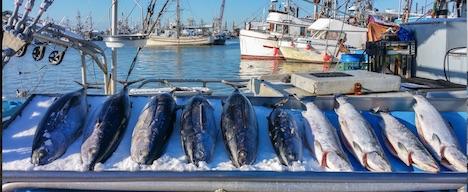
By Brian Collett — The tuna company Thai Union has joined forces with the environmental NGO Greenpeace to improve labour practices, expand sustainable operations and minimise destructive fishing.
Thai Union, based in Bangkok, the world’s largest tuna producer and one of the world’s largest seafood companies, will work with Greenpeace to tackle illegal fishing and overfishing and protect the livelihoods of many thousands of employees in its supply chain.
The partnership follows a global surge in consumption of wild and farmed fish and seafood that spotlights an industry often plagued by questionable ethical conduct.
FAO, the UN’s Food and Agriculture Organisation, has recorded that in 50 years worldwide fish consumption has almost doubled. On average every one of the world’s seven billion people now eats more than 20 kilograms a year.
The reasons are health-related, economic and environmental. FAO director-general José Graziano da Silva has pointed out: “Life below water, which the Sustainable Development Agenda commits us to conserve, is a major ally in our effort to meet a host of challenges, from food security to climate change.”
He talks of “the enormous and growing potential of aquaculture to boost human nutrition and support livelihoods with productive jobs”.
In developed countries health-conscious consumers have increased their fish intake because it offers protein, omega-3 fatty acids, vitamins, calcium, zinc and iron and is a wholesome alternative to meat.
Poorer countries have shown some preference for fish as a less costly nutrition source, ensuring that more people are fed.
FAO reports as evidence: “In Nigeria, aquaculture output is up almost 20-fold over the past two decades, and all of sub-Saharan Africa is not far behind. Chile and Indonesia have also posted remarkable growth, as have Norway and Vietnam, now the world’s No 2 and No 3 fish exporters.”
Against this background Thai Union, whose products include Chicken of the Sea in the US and John West in the UK and the Netherlands, has promised a wave of reforms.
The company aims to halve by 2020 the number of its suppliers’ aggregating devices, the tethered buoys and floats that attract fish, and to double the amount of traditionally caught fish that it markets.
It intends to place independent observers on suppliers’ ships to spot labour abuse and to develop a code of conduct to ensure fair treatment of workers.
Another objective is digital traceability allowing stakeholders to track tuna back to vessels and to see the fishing methods used.
Thai Union and Greenpeace will meet every six months to measure progress, and there will be an independent third-party review at the end of 2018.
Johnny Hansen, chair of the fisheries section of the International Transport Workers Federation, responded with a demand for an enforceable collective bargaining deal for all Thai Union supply chain employees.
Greenpeace International executive director Bunny McDiarmid said: “Now is the time for other companies to step up and show similar leadership.”
Sarah King, senior oceans strategist at Greenpeace Canada, said the agreement followed two years of “relentless campaigning” and that efforts would continue in order to “stop out-of-control companies from wreaking havoc on ocean ecosystems and people’s lives”.
The Thai Union-Greenpeace partnership coincides with new industry projects directed at ethical improvements.
In Britain the Co-op convenience retailer has gathered together stakeholders to form the Scottish Salmon Farming Group to promote responsible fishing and selling.
The Co-op, whose salmon sales have just jumped 22 per cent, wants to work closely with communities in Scotland where the fish are farmed to maintain standards.
Aisla Jones, the Co-op’s fish sustainability manager, said: “We’re proud to sell 100 per cent fresh farmed Scottish salmon in our stores, and at a time when consumer demand is rising now is the perfect time to launch this new Scottish Salmon Farming Group.”
Another British project is the founding of the On the Hook advocacy group of MPs, non-profits, food retailers and conservation activists to challenge the certification of the world’s largest tuna fishery by the Marine Stewardship Council, whose mission is to maintain sustainable fishing standards.
The group, led by the celebrity chef Hugh Fearnley-Whittingstall, wants an immediate halt to the council’s recertification of the tuna fishery in waters controlled by the Parties to the Nauru Agreement, a conservation and tuna management pact supported by many Pacific nations.
On the Hook claims the certification permits the use of uncertified fishing methods in an area yielding 25-30 per cent of the world’s tuna supply and 60 per cent of the western and central Pacific catch.
The council is reviewing its standards but will not report before August 2018.
On the Hook maintains recertification would throw doubt on the reputations of the council, retailers and other stakeholders. The council replies that its standards guarantee responsible fishing and traceability.
Elsewhere, fish species widely considered to be threatened include those used for sushi, which has become a globally popular dish. SeafoodSource, an industry news provider, held a roundtable webinar on September 21 to collect views on conserving sushi species but has not yet published results.
In China authorities in the southern Fujian province have closed down a quarrying and construction company after it destroyed coastal mudflats that were home to aquaculture and wild fisheries.
The China National Ocean Supervisory Bureau led a multi-agency action to dismantle illegal buildings that had obstructed water flow and destroyed habitats.
The bureau’s next ethical moves will be increased patrols to prevent a recurrence.
Further information: www.sustainablefish.org
TriplePundit has published articles from over 1000 contributors. If you'd like to be a guest author, please get in touch!














